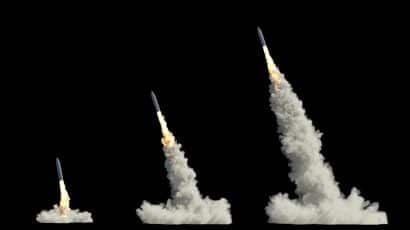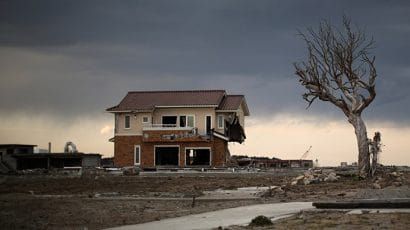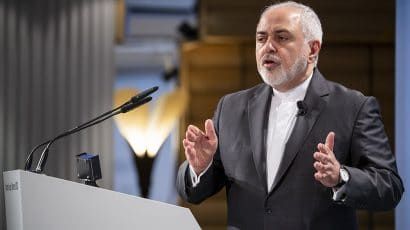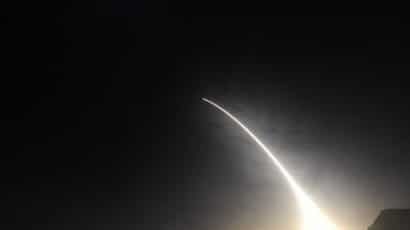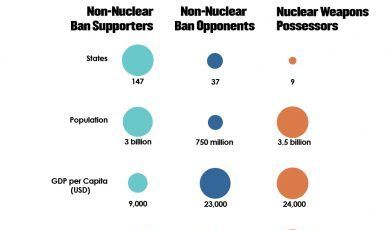Search results for nuclear terrorism
Declaring a no-first-use nuclear policy would be exceedingly risky
With Russia and China advancing on their neighbors, now is not the time for a US promise never to launch a first nuclear strike.
The future of the Iranian nuclear deal is still uncertain
A year after Iran and world powers signed a historic nuclear agreement, politicians in Washington and Tehran seek to derail it as the latter continues to struggle with economic challenges.
The historic debate about Iran’s nuclear program
Today's doubts about Iran's nuclear program are anything but new.
One way to fight radiological terrorism: alternative technology
Permanently reducing the threat posed by radiological sources will require minimizing and then eliminating their use altogether, transitioning to alternative technologies and practices.
Leave Iran’s missiles out of nuclear talks
Why negotiators in Vienna shouldn’t yet embark on dealing with Iran’s ballistic missiles.
The banality of death by nuclear power
Scientists estimate that 1,000 people will die from cancer as a result of their exposure to radiation from the Fukushima Daiichi disaster. This number is often contrasted with the 20,000 who died in the March 11 earthquake and tsunami that caused the nuclear debacle -- presumably to suggest that the 1,000 deaths are less significant and should not be used to justify a nuclear power shutdown.
The Fukushima tragedy demonstrates that nuclear energy doesn’t make sense
From the time we learn to walk, mistakes are inherent in the process of human learning. An essential design principle for technology should be that we, the generations that benefit, should bear the major costs of its mistakes. Nuclear power fails this simple test miserably. It is just not possible to pick up the pieces … Continued
Parting words: Gates and tactical nuclear weapons in Europe
In a recent speech in Brussels, departing Defense Secretary Robert Gates criticized European members of NATO for allowing defense obligations to fall increasingly upon the United States, continuing a funding imbalance that could lead Americans to question whether the costs of NATO are justified.
Will the Senate support new nuclear arms reductions?
President Barack Obama has an ambitious agenda on nuclear weapons issues that will take a long time to implement. For example, the earliest the Senate is likely to vote again on the Comprehensive Test Ban Treaty (CTBT) is 2010. Likewise, a Fissile Material Cutoff Treaty is at least three years away. Ditto for the president's goal of safeguarding all vulnerable nuclear weapons and nuclear materials worldwide. And then there is his most ambitious goal of all--a nuclear-weapon-free world, which even he has suggested probably won't take place in his lifetime.
The risks of North Korea’s nuclear restart
On April 13, the U.N. Security Council condemned North Korea's rocket launch earlier in the month. Within nine hours, North Korea denounced and rejected the Security Council statement; expelled international inspectors and the U.S.
10 years after Fukushima: Are Japanese nuclear power plants safe?
Following the Fukushima Daiichi Nuclear Power Station accident in 2011, the Nuclear Regulation Authority set stricter and more rational standards. However, in practice, Japanese regulators have often compromised their reviews. It’s worth asking: Are the restarted Japanese nuclear power plants safe?
Nine hurdles to reviving the Iran nuclear deal
Although reviving the Iran nuclear agreement is certainly still possible, it won’t be easy. The two sides will need to overcome nine hurdles to make it happen.
Revenge is a dish best served nuclear. US deterrence depends on it.
Deterrence appears to depend on rational actors who desire survival above all else. But it's revenge, not rationality, that often drives decisions.
Trump and Putin meet under a nuclear cloud
In a few days, US President Donald Trump will meet with Russian President Vladimir Putin in Helsinki. Media coverage will undoubtedly highlight Russian meddling in the 2016 US presidential election, but it would be remiss not to discuss the nuclear implications of the Trump-Putin summit as well. Kto vinovat? (Russian for “who is to blame?”) … Continued
Game of Thrones: Dragons are the nuclear option
We’re in the midst of a new Game of Thrones season, which seems to be finally reaching a grand finale. In the latest episode, known as “The Spoils of War,” viewers get a climactic, graphic, explicit view of the power of the heroine’s dragons, which reduce men, women and children to ashes in seconds, destroying … Continued
New terminology to help prevent accidental nuclear war
Since the advent of US and Russian nuclear-armed ballistic missiles and early warning systems, the danger has always existed that a false warning of attack—believed to be true—could cause either nation to inadvertently launch a responsive “retaliatory” strike with its own nuclear forces. Fear of a disarming nuclear strike, especially during a crisis, creates immense … Continued
Where the presidential candidates stand on nuclear issues
With primary season upon us, the presidential candidates have been busy debating and making policy presentations so that we can begin to glean some ideas of their views on everything from the economy to national defense. As is often the case, the media haven't focused on the candidates' views on technical issues, but in the end, these may be among the most significant issues that the next president will face.
Realidad y fantasía en Asia Meridional nuclear
India y Pakistán son en última instancia los responsables de solucionar sus propias crisis, pero la nuclearización del subcontinente ha internacionalizado sus controversias. Las tensiones en Asia Meridional ya no son una cuestión regional, debido a las posibles catastróficas consecuencias humanitarias en todo el mundo de un conflicto nuclear en esa región. En mi segundo … Continued
Haves, have-nots, and need-nots: The nuclear ban exposes hidden fault lines
The nuclear ban challenges conventional models of the nuclear age—and illustrates the consequences of structural inequities in the pursuit of disarmament.
